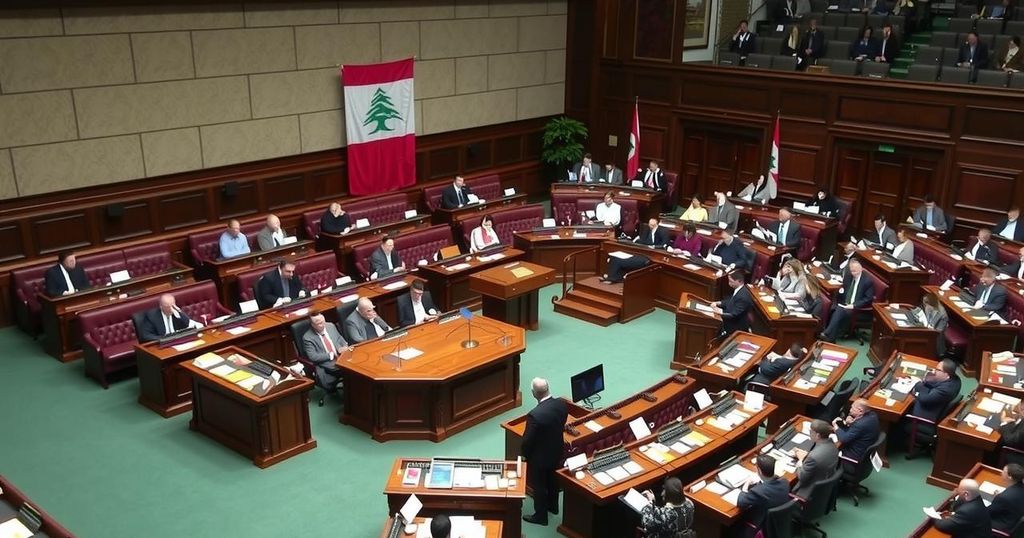World news
ASIA, CENTRAL ASIA DEPARTMENT, ECONOMIC SANCTIONS, ELIAS AL - BAYSARI, FRANGIEH, GENERAL SECURITY AGENCY, GOVERNANCE, HEZBOLLAH, IRAN, ISRAEL, JIHAD AZOUR, LEBANON, MICHEL AOUN, MIDDLE EAST, NORTH AMERICA, POLITICS, PRESIDENTIAL ELECTION, SAUDI ARABIA, SECURITY, SUL, UNITED STATES
Marisol Gonzalez
0 Comments
Lebanon Parliament Strives to Resolve Presidential Vacancy After Two Years
Lebanon’s parliament is making another attempt to elect a president after a two-year void following the end of Michel Aoun’s term. Joseph Aoun, the army commander, is the leading candidate, with backing from key foreign powers. His election faces constitutional challenges, but the political landscape has shifted with the withdrawal of support for an alternate candidate, Suleiman Frangieh. A president is critical for stabilizing Lebanon’s ailing government amid ongoing economic crises.
Lebanon’s parliament has taken yet another step toward electing a president following a two-year vacancy that began after the departure of former President Michel Aoun in October 2022. Army commander Joseph Aoun is currently the front-runner for the position and is viewed favorably by both the United States and Saudi Arabia, which are critical for Lebanon’s recovery efforts after a prolonged conflict involving Israel and Hezbollah. This latest vote is significant, as previous attempts have consistently failed to reach a consensus.
Previously, Hezbollah expressed support for Suleiman Frangieh, who has ties to former Syrian President Bashar Assad. However, Frangieh unexpectedly withdrew from the running and endorsed Joseph Aoun, potentially paving the way for his presidency. Lebanon’s complex sectarian political system often leads to impasses, exemplified by a previous presidential vacancy lasting nearly 2.5 years between 2014 and 2016, which concluded with the election of Michel Aoun.
Though Joseph Aoun is a leading candidate, he faces a constitutional barrier since sitting army commanders are typically prohibited from seeking the presidency. This restriction has been previously waived, yet it implies Joseph Aoun requires not only broad support but also navigates additional procedural hurdles. Generally, a candidate can be elected by a two-thirds majority on the first ballot or a simple majority thereafter; however, for Joseph Aoun, two-thirds support is a prerequisite even in subsequent rounds.
Additional candidates include Jihad Azour, a former finance minister, and Elias al-Baysari, acting chief of Lebanon’s General Security. A newly elected president will be essential for establishing a permanent government, replacing the caretaker administration that has diminished power during this extended vacancy. The next government will need to address critical issues, including the aftermath of the Israel-Hezbollah conflict and Lebanon’s ongoing economic crisis, which has severely impacted the financial stability of the country.
The impending presidential election in Lebanon comes after a protracted period of political stagnation, marked by twelve previous failed attempts to select a successor to former President Michel Aoun. The significance of this election is heightened by the prevailing instability due to the two-year void in presidential leadership, which has strained Lebanon’s governance amid existing economic challenges. The support of foreign powers, particularly the United States and Saudi Arabia, is recognized as crucial for Lebanon’s future recovery endeavors. Additionally, Hezbollah’s withdrawal of support for an alternate candidate signifies shifting political dynamics capable of influencing the election outcome. Lebanon’s current economic plight necessitates decisive government action, especially after years of crisis that have ravaged its financial systems.
In conclusion, Lebanon’s parliamentary efforts to elect a new president are crucial following two years of political vacancy. The leading candidate, Joseph Aoun, represents a potential shift in Lebanon’s leadership landscape, which is now influenced by new political alignments and external support. The outcome of this election is significant, as the ensuing government will face daunting challenges, including reconstruction and navigating the complexities of the nation’s protracted economic crisis.
Original Source: www.hindustantimes.com




Post Comment